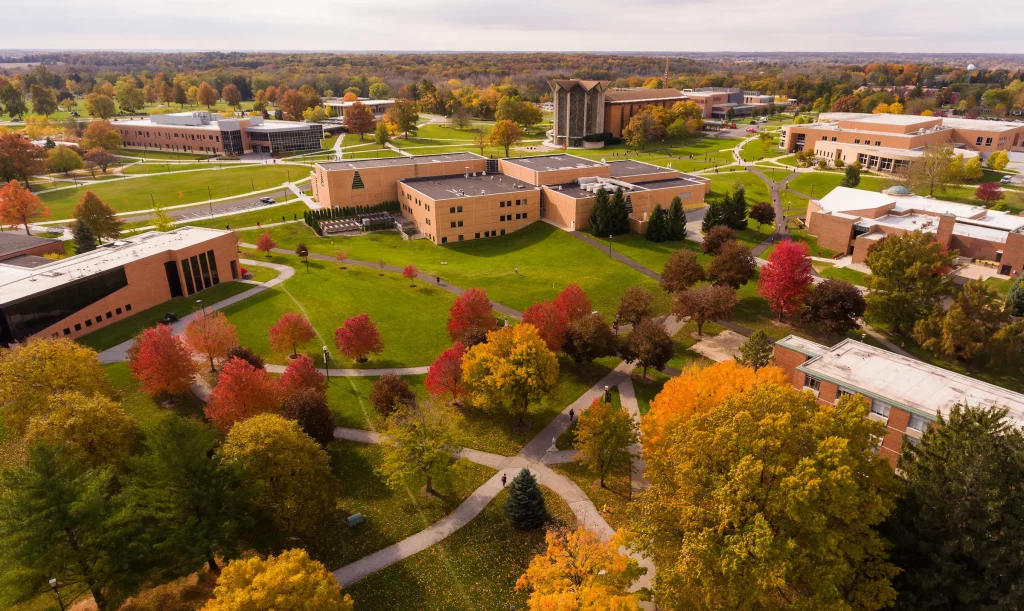A Valpo Alumna Pushes Forward Towards a Sustainable Future
“I think this is an important topic to pursue as humans need to make sure that our industrial processes are sustainable or leave minimal impact on the world around us,” Rachel says. “Finding ways to recycle already used resources into something valuable is an important part of ensuring sustainability from a systems perspective.”
 Rachel came to Valpo on an academic scholarship, as well as a music scholarship for playing the French horn. What really sold her on the University was an environment that promoted academic excellence and the chance to pursue personal growth.
Rachel came to Valpo on an academic scholarship, as well as a music scholarship for playing the French horn. What really sold her on the University was an environment that promoted academic excellence and the chance to pursue personal growth.
“I liked the smaller class size environment and the campus setting,” Rachel says. “Valpo also offered me the opportunity to take part in all the different activities I wanted for the least cost.”
As a student, Rachel took full advantage of the opportunities Valpo had to offer. In addition to her mechanical engineering major, she was a member of Christ College — The Honors College, earning a complementary major in the humanities and exemplifying the University’s dedication to produce scholars that are well-rounded in addition to excelling in their field. That bigger picture frames her work even today.
“I use my technical research skills that I gained at Valpo every day, but I think the most unique part of my education that has stuck with me is from Christ College,” Rachel says. “As a researcher, you need to see a bigger guiding picture of where your research is going. Using what I learned in Christ College, I continually think about if my research is helping to shape the world in a good and productive way.”
Rachel was a founder of the Council for Engineering Inclusion and Equality, which promotes a diverse and open academic environment for people of all backgrounds within the College of Engineering. Rachel was also involved with Working Across Vocations Everywhere Through Service, an organization that collaborates with underdeveloped communities to improve their quality of life, and she was a member of the engineering honors society Tau Beta Pi.
Off campus, and beyond U.S. borders, Rachel studied abroad at University College Utrecht in the Netherlands during her junior year. The experience taught Rachel the value of differing perspectives and how diversity of thought can be leveraged for progress.
“In my mind, this highlighted the need for inclusion in all activities, including scientific ventures. New perspectives bring innovation, which is needed today,” Rachel says. “I realized that different areas of the world will have different solutions to the same problems and questions surrounding climate change and renewable energy. That’s ok; we should not discount others’ solutions, but instead seek to understand why they believe it is the best solution for them.”
After graduating from Valpo, Rachel realized that she wanted to learn more about sustainability, be more involved in finding solutions, and really push herself and her creative prowess to their limits by continuing her career in academia.
“I wanted to take more specialized classes and have the chance to apply what I was learning from these classes,” Rachel says. “I love to be creative with what I am working on, but I felt like I needed more advanced technical understanding to be more critical of my own creativity.”
Her second project tackles the problem of carbon dioxide waste in ocean water. Acting like gigantic sponges, the oceans have absorbed an astounding amount of carbon dioxide produced by human waste, and research like Rachel’s finds new and more efficient ways to capture, remove, and store that waste away from natural environments.
For students in the College of Engineering today who want to follow a similar path, Rachel emphasizes the importance of having clear, defined goals and a drive to see change in the world.
“Find a topic you care about and research what technological problems are preventing the improvement that you want to see,” Rachel says. “Then, figure out a next step you can take to get technology even a little bit closer to achieving what you want.”
